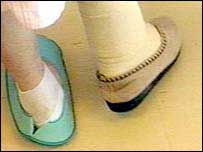Touch
The skin serves a protective function by buffering us from the environment. Skin changes leave the older person vulnerable to discomfort and harm. Due to reduced sensitivity, heat sources such as heating pads, hot water bottles, and pot handles can hurt the skin before the elder realizes that damage is occurring.An older person may develop a greater sensitivity to cool temperatures and drafts. This is caused by a decline in sweat gland activity, a decrease in the ability to maintain a normal body temperature due to poorer circulation, and a thinning of the skin. Wrinkling, drying, and scaling also occur. The skin tears and breaks more easily, increasing the chance of injury and infection.
To cope with these changes, the older person should:
- Avoid extreme exposure to sun and wind, which speed up the aging of the skin.
- Avoid daily baths or showers, as these tend to dry out the skin.
- Moisturize the skin with body oil after a bath, gently patted on with a washcloth.
- After bathing, pat the skin dry.
- Drink one to two quarts of fluid daily to maintain normal body temperature and functioning.
 Changes in Bones and Muscles
Changes in Bones and Muscles
Aging adults, especially the very old, are vulnerable to broken bones. In addition, joints stiffen and connecting ligaments between bones lose their elasticity. Hand and foot pain may result. Although there is no known way to prevent sometimes painful changes in aging muscles, bones, and ligaments, regular exercise helps to assure continuing mobility in old age. Most physicians feel that walking, along with adequate rest and a nutritious diet, are tremendously valuable for maintaining mobility and fitness in the later years.
Health professionals advise middle-aged and older adults to:
- Eat a well-balanced diet with the proper amount of calcium and other essential nutrients.
- With a physician's guidance, start or continue a regular exercise program.
The suggestions covered under vision and hearing, as well as those listed below, will help the older person take the necessary precautions to prevent falls.
- A no-slip bath mat and grasp rails are installed in the shower or tub.
- A seat is placed in the shower if standing is difficult.
- If scatter rugs are used, they should have no-slip backing or mats underneath.
- Chairs are sturdy and do not wobble, break, or tip over.
- A safe, sturdy step stool is available to reach high places.
- The telephone is placed in a convenient location.
- Chairs and sofas are at a height that permits easy sitting.
- Floors and stairs have non-skid surfaces.
- Railings line all staircases.
- Staircases and walkways are uncluttered.
- Front and back steps, and inside flooring and carpeting are in good condition.
- Instructions for the proper use of medications are followed carefully, as improper types or dosages often cause falls.

No comments:
Post a Comment